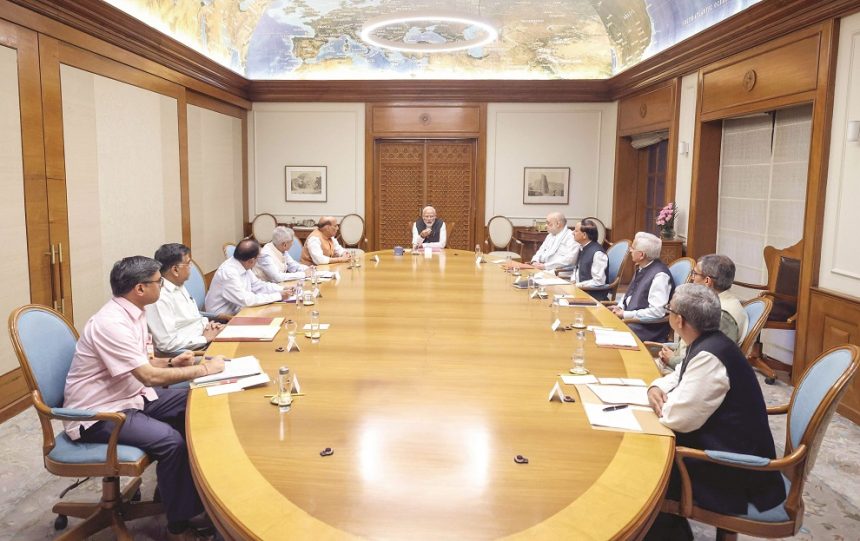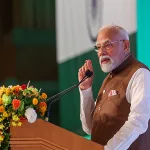Srinagar, April 23: Following the terror attack in Pahalgam, Kashmir, which claimed the lives of 27 tourists, India on Wednesday “held in abeyance” the Indus Waters Treaty (a crucial water-sharing agreement established in 1960), downgraded diplomatic relations with Pakistan, expelled diplomats and defence forces officials from Pakistan High Commission in Delhi, and cancelled all visas granted to Pakistan nationals, asking them to leave in 48 hours.
Briefing reporters, Foreign Secretary Vikram Misri said that the Cabinet Committee on Security (CCS) met on Wednesday evening under the chairmanship of the Prime Minister to take stock of the situation and deliberate on the government’s strategy.
Foreign Secretary Vikram Misri said the attack had “clear cross-border linkages” and came at a time when Jammu and Kashmir was moving towards peace and economic progress.
Misri said, “The CCS condemned the incident in the strongest terms and expressed deep condolences to the victims’ families. Strong expressions of support and solidarity have been received from many Governments around the world, which have unequivocally condemned this terror attack. The CCS recorded its appreciation for such sentiments, which reflect zero tolerance for terrorism,” he said.
In response, Misri said India will implement a series of strong measures. “The Indus Waters Treaty of 1960 stands suspended until Pakistan takes credible and irreversible action to dismantle its terror infrastructure,” he said.
He further announced that the Integrated Checkpost at Attari will be shut with immediate effect. “Pakistani nationals who have already entered India with valid endorsements will be allowed to return via the same route until May 1, 2025,” Misri said.
Another major step, he said, is the cancellation of the SAARC Visa Exemption Scheme for Pakistani nationals. “All such visas are hereby cancelled. Those present in India under this scheme have been directed to leave within 48 hours,” Misri added.
“India has declared the Pakistani Defence, Military, Naval, and Air Advisors posted in New Delhi as persona non grata. They have one week to leave the country,” Misri said, adding that in a reciprocal move, India will withdraw its own Military Advisors from Islamabad. These diplomatic positions will be abolished, he said.
He further informed that “Support staff working with these advisors will also be repatriated, and the overall strength of both High Commissions will be scaled down from 55 to 30 by May 1.”
“All Indian security agencies have been asked to remain on the highest alert,” Misri said. “The perpetrators of the Pahalgam attack will be brought to justice. Their sponsors will face consequences.”
Referring to India’s recent success in securing the extradition of Tahawur Rana, Misri said, “India will not rest until those responsible for such attacks are held accountable and punished under international law.”
How it impacts Pak
The treaty’s suspension would considerably affect Pakistan, as this agreement regulates the usage and allocation of water from the Indus River system and its tributaries, which are essential for Pakistan’s water requirements and agricultural sector. Pakistan is already one of the most water-stressed countries in the world, and per capita availability is declining rapidly.
Water Supply Impact
Pakistan may lose access to 135 million acre-feet of water annually.
Major rivers affected: Indus, Jhelum, and Chenab—critical for irrigation.
Agriculture & Food Security
Punjab and Sindh, Pakistan’s agricultural heartlands, will face severe water shortages.
Potential for widespread crop failure (wheat, rice, cotton).
Food prices likely to rise, increasing inflation and hunger.
Power and Energy Crisis
Reduced water flow will impact hydropower production.
Worsening of energy shortages, especially in summer months.
Economic Consequences
Agriculture contributes ~20% to Pakistan’s GDP—could see a sharp decline.
Job losses in the agriculture sector, affecting rural livelihoods.
Overall economic instability and pressure on national finances.
Environmental Consequences
Drying of river ecosystems, affecting flora and fauna.
Overuse of groundwater, risking long-term depletion.
Threat of desertification in already arid regions.
What is Indus Water Treaty?
Signed in September 1960 during the time of Prime Minister Jawaharlal Nehru and then-Pakistan President Ayub Khan, the Indus Waters Treaty is an agreement on water-sharing between India and Pakistan. It was brokered by the World Bank after heavy negotiations that went on for nine years.
It includes the uninterrupted flow of Rivers Indus, Jhelum, Chenab, Ravi, Beas and Sutlej between the two countries and the usage of waters for domestic and agricultural purposes.
India had previously blocked water to Pakistan for some time in 1948, but it was later restored after the ceasefire. In 1951, Pakistan had taken the matter to the United Nations (UN) and accused India of cutting the supply of water to many Pakistani villages.
The agreement came into existence in 1954 and was finally signed in 1960.
Under the agreement, India got control over the three eastern rivers – Ravi, Beas and Sutlej; whereas Pakistan got control over the three western rivers Indus, Chenab and Jhelum. All the waters of the Eastern Rivers were allocated to India for unrestricted use while India is under obligation to let flow all the waters of the Western Rivers, except for the domestic, non-consumptive and other uses permitted in the Treaty.
The treaty provides India 20% of the water from the Indus River System and the rest 80% to Pakistan. The agreement came into effect on April 1, 1960 and was initially valid till March 31, 1970.








